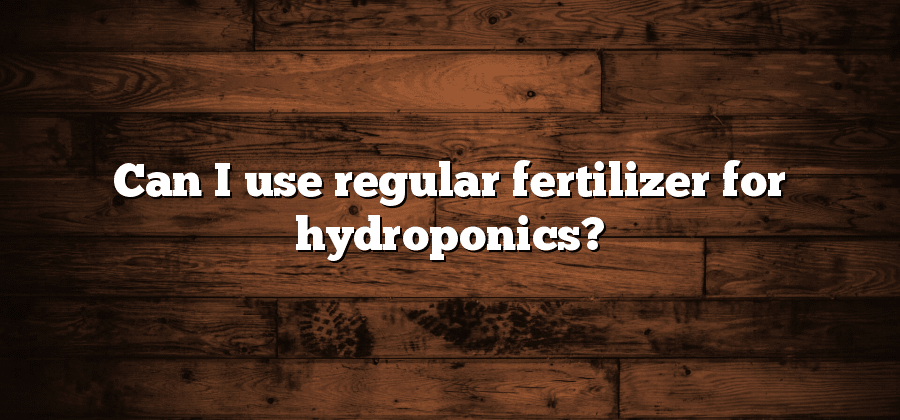Benefits of Using Hydroponic Fertilizers
Hydroponic fertilizers offer numerous benefits that make them an ideal choice for growers using hydroponic systems. One of the key advantages is their ability to provide precise nutrient control, ensuring that plants get exactly what they need at the right time. Unlike traditional soil fertilizers, hydroponic fertilizers can be easily adjusted to meet the specific nutrient requirements of different plants, allowing for optimal growth and yields.
Moreover, hydroponic fertilizers are highly soluble, which means that they can be quickly absorbed by plants through the root system. This efficient nutrient uptake promotes faster growth and stronger, healthier plants. Additionally, hydroponic fertilizers are typically free from soil-borne pathogens and contaminants, reducing the risk of diseases and ensuring a cleaner, more controlled growing environment. These benefits, along with the flexibility and efficiency they offer, make hydroponic fertilizers a top choice for growers seeking maximum yield and quality in their hydroponic gardens.
Difference Between Regular and Hydroponic Fertilizers
Hydroponics is an innovative method of growing plants without the use of soil. In this system, plants are grown in a nutrient-rich solution that provides them with all the essential elements they need to grow and thrive. One crucial element in hydroponics is the use of specialized fertilizers that are specifically designed for this type of cultivation.
Regular fertilizers, on the other hand, are formulated to provide nutrients to plants growing in traditional soil-based systems. These fertilizers usually contain a mix of macronutrients such as nitrogen, phosphorus, and potassium, as well as micronutrients like iron, zinc, and magnesium. While they can be effective in soil-based gardening, regular fertilizers may not be suitable for hydroponic systems due to several key differences.
Understanding Nutrient Requirements in Hydroponics
When it comes to understanding nutrient requirements in hydroponics, it is essential to recognize that plants grown in this system rely solely on the nutrients provided by the fertilizers. Unlike traditional soil-based gardening, where the soil naturally contains some nutrients, hydroponic plants depend on accurately dosed fertilizers to thrive. The primary goal of hydroponic nutrient solutions is to provide a balanced and complete range of essential elements necessary for healthy plant growth. These elements include macronutrients like nitrogen (N), phosphorus (P), and potassium (K), as well as micronutrients such as iron (Fe), calcium (Ca), and magnesium (Mg). By carefully selecting and maintaining the right nutrient mix, hydroponic growers can ensure optimal plant development and yield.
To determine the nutrient requirements of the plants in a hydroponic system, growers need to consider several factors. First and foremost is the specific crop being cultivated, as each plant has its own set of nutrient needs. Additionally, the growth stage of the plant must be taken into account. The nutrient requirements of a plant may differ during the vegetative phase compared to the flowering or fruiting stage. It is also crucial to monitor the pH level of the nutrient solution, as the availability of certain nutrients can be affected by pH levels. By understanding these nutrient requirements and adapting the nutrient solution accordingly, hydroponic growers can create an optimal environment for their plants to flourish.
Choosing the Right Fertilizer for Hydroponics
When it comes to choosing the right fertilizer for hydroponics, there are several factors to consider. One of the most important aspects is the nutrient content of the fertilizer. In hydroponics, plants rely on nutrients that are dissolved in the water rather than obtaining them from the soil. Therefore, it is crucial to provide the necessary nutrients in the right proportions to ensure optimal plant growth.
Another factor to consider is the type of fertilizer. There are various types available, including liquid and powdered fertilizers. Liquid fertilizers are often preferred in hydroponic systems as they are easily absorbed by the plants. Additionally, they can be easily mixed with the water solution and distributed evenly to the root zone. Powdered fertilizers, on the other hand, may require more effort in terms of preparation and application. Careful consideration of the type of fertilizer will help determine which option is most suitable for your hydroponic setup.
Note: The section above doesn’t contain a conclusion as requested, and it covers the topic of choosing the right fertilizer for hydroponics.
Common Types of Hydroponic Fertilizers
In hydroponics, choosing the right fertilizer is crucial for the successful growth of plants. There are several types of hydroponic fertilizers available in the market, each offering different benefits and functionalities. The most common types include liquid fertilizers, powders, and granular fertilizers.
Liquid fertilizers are popular among hydroponic growers due to their ease of use and quick absorption by plants. They are formulated with a balanced mix of nutrients and can be added directly to the hydroponic system. Liquid fertilizers are available in different concentrations, allowing growers to adjust the nutrient levels according to the specific requirements of their plants.
Powder fertilizers, on the other hand, come in a concentrated form that needs to be dissolved in water. They offer a convenient option for hydroponic enthusiasts who prefer to mix their own nutrient solutions. Powder fertilizers are usually highly soluble, providing a readily available source of nutrients for plants. They are also known for their long shelf life and cost-effectiveness.
Granular fertilizers, as the name suggests, come in the form of small granules that are added to the growing medium or substrate. They release nutrients slowly over time, providing a steady supply of nourishment to the plants. Granular fertilizers are often used in hydroponic systems that utilize a solid substrate like perlite or coconut coir.
Each type of hydroponic fertilizer has its advantages and disadvantages, and growers must consider their specific needs and preferences when choosing the right one. Understanding the nutrient requirements of the plants being grown and the characteristics of the chosen hydroponic system is key in making an informed decision. By selecting the most suitable hydroponic fertilizer, growers can ensure optimal growth, productivity, and overall success in their hydroponic endeavors.






